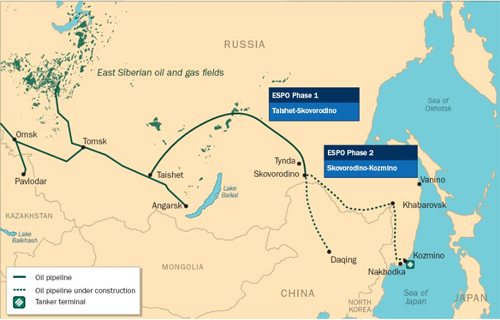Russia inaugurates Far East oil pipeline to China
30 Aug 2010
Shanghai: In a significant development Russia inaugurated its section of a crude oil pipeline that will feed output from its oilfields in eastern Siberia to China. The inauguration of the pipeline will not only help in stabilising oil supplies to China, which is the world's largest energy consumer but also help Russia shift export emphasis away from the West European market.
Inaugurating the pipeline, Russian prime minister Vladimir Putin said, ''This is an important project because we are beginning to diversify the delivery of our energy resources.'' In comments posted on his website the Russian PM said, ''Thus far, shipments were made to our European partners.''
The inauguration took place in Skovorodino in Russia's Far Eastern Amur region.
The pipeline runs a mere 64-kilometre (40-mile) on the Russian side but travels a longer 960 kilometres on the Chinese side to the town of Daqing, a major oil production base located in that communist country's northeast.
Russian TV reports said China will begin testing the pipeline sometime in late September after completing construction of its section.

The pipeline will initially carry 30 million tons of oil a year, which may eventually expand to 50 million tons, Putin was quoted as saying.
In his comments, Putin pointed out that Russia is currently pumping 120-130 million tons of oil to Europe and only ''a small amount to Asia Pacific.'' The new pipeline changes the equation.
Amongst other things Russia's importance as a strategic partner for China increases considerably.
The partnership suitably matches the world's biggest energy producer, Russia, with China which overtook the United States as the world's largest energy consumer last year.
Though Europe is pre-eminently the largest oil and gas export market for Russia, both Beijing and Moscow would be anxious to cement their new partnership in the energy sector for obvious reasons.
For Moscow, the eastern pipelines allow it to access a new and potentially huge market in China that will enable it shift its export emphasis away from West Europe, with which it has shared traditionally hostile relations.
At its end, the NATO bloc nations for long have sought ways and means to reduce their dependence on Russian energy exports.
For China, the eastern pipelines make available a source of energy supply much closer to home, reducing its supply-chain headaches and the strategic vulnerability that raises from sourcing supplies from far-away politically volatile regions.
Speaking at Skovorodino Putin also said that cooperation would not be limited to oil exports but could extend to the exploitation of Russian Far East's abundant resources with Chinese help.
Significantly, Putin signed dozens of commercial agreements, worth $3.5 billion, in a visit to Beijing late last year, which will allow construction of two natural gas pipelines to China from gas fields in Russia's Far East.
These pipelines will have the potential to provide supplies sufficient to meet China's current consumption.


















